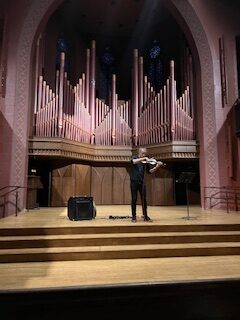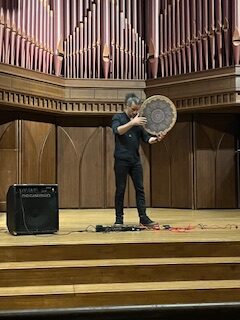by Hedaya Shamun-Abdullah1 & Nael Hijjo2
Fear, Departure, and Hope…

He stood alone on the dim stage, his eyes filled with sadness and longing, with neither shadow nor band accompanying him, standing still as if he had descended from the sky. He smiled at us as if he knew our stories one by one. His deep, steady voice came to us, dressed in black, shaded by the faint lights of Memorial Church which was conspiring with him to embrace us after a long day and an arduous life journey.
Ameen, like an angel, was suffering with us as he began to play his first musical piece titled “Fear”. He began to open the doors of fear in our hearts, locked with artificial locks for many years. His fingers clutch the violin, while he rested his head lightly on its top, beginning to enchant us with gentle, successive beats.
The doors of our hearts opened one after another; our fragility, caused by fear, was revealed through his music, and we melted into one spirit— a tired, crucified spirit on the planks of salvation. We walked toward him individually and collectively, while still mesmerized in our seats. Soaring like birds that have lost their wings but still cling to a life buoy, dreaming of flying high again. The paths of darkness created by war and fears inside us gradually faded away, allowing us to see ourselves in the mirror of fear and awe, bewildered by our condition.
The trembling of the violin carried us to another space we had never seen before, reaching its climax when we felt a prick and pain in our broken hearts. We glimpsed the trembling of light in the spot where Ameen Mokdad stood tall despite pain, sadness, and fear. Our souls orbited him like children gathering around their favorite teacher!
With his melodies, Ameen dissolved the barriers of fear, horror, pain, and oppression, reaching our tears. We saw our wounds on his hands, like an experienced surgeon diagnosing his patients’ condition. He played the violin, with his fingers gently beating our hearts at times, and at other times with a bit of harshness so we could wake up from our sleep and pain.
He seemed alone, but he was all of us— from different homelands that we painfully parted, striving to find hope, warmth, and peace elsewhere. We hid the fear of the unknown, but Ameen, with his creative and artistic music, brought us back as children with rosy dreams. He was like a father meeting his long-lost children after decades, embracing us after we had been lost in the fierce battle of life. One by one, he took us to soothe our tired spirits, bringing us from darkness back into light, life, and hope…!
Music: A Remedy for the Soul
In his first piece ‘Fear,’ artist Ameen Mokdad narrated to us his journey with fear—fear of militias, fear of the sectarian government, and fear of Daesh (ISIS). Fear of protesting against injustice and authoritarian regimes, against terrorist organizations. Fear of speaking the truth. Fear of demanding safety, peace, and human dignity. Ameen spoke of the fear that possessed both soul and body. He told us how his love for music liberated him spiritually from slavery to fear, and how he escaped physically from house to house, pursued by militias of fear and terrorism.

While recounting these stories, we began to live with him this epic heroism in spirit. His victory over fear was a victory for us all. From the very first moment, Ameen, without permission, touched our pain and healed it like a saint standing on stage. He played his sad violin so brilliantly, lifting us to the sky so we became free birds, freeing us despite the harshness of grief and pain that nested in our souls.
His second piece was called “Departure.” After the land around him tightened and danger began to threaten not only him—now he submitted to his faith; assassinated by state gangs or Daesh—but also his relatives and friends sheltering him, he decided to leave. Ameen started playing the tune of departure. Simply… someone was attacking you, running after you—you felt it in the roads and in people’s eyes. You fell into the well of your heart as if you had never walked these streets before. His warm voice repeated, “Aman,” (a word used to express a plea for mercy, safety, or a cry for help) as if another independent musical piece emerged from the stage. It came with the voice of the tender, profound artist, suffused with sadness for parting loved ones. You chased the echo of his voice coming to you, surrounded by darkness from within. His voice rose more and more: “Aman… Aman,” pleading for a celestial hand to help him bear the pain of departure. You ran like a child, soared like a bird, danced like a flower that lost its nectar but still wanted to survive…
Chasing images and words, his deep voice resonated, touched by his spirit—as if the world’s suffering was present before you, within your soul and heart. You cried comfortably despite the bitterness and pain surrounding you. Your fear, departure, and life passed before your eyes like a film strip, pulled by his warm, deep voice and the vibrations of his music. Despite its pain, it revived you anew, renewing your right to pain and expression of fear of a new world forming before you.
You ran again through the streets of your heart’s city, despite the destruction that had befallen it. When a musician like Ameen, coming from the midst of the destruction of his beloved city, Mosul in Iraq, and the wreckage of his life in his homeland, with fears still inside him, awakened in you your own pains, making you cry a lot… crying was your first station for healing.
At the end of the concert, Ameen played for us the melody of ‘Hope’. Despite losing some family members and loved ones killed by terrorist militias, and despite his forced displacement from a homeland he loved and adored, and despite Daesh destroying his musical instruments, Ameen, the human, wanted us not to leave the concert with tears of defeat. He wanted to send us hope that there was goodness in this world, that there was what deserved to live for on this earth. He wanted to teach us that though they destroyed our musical instruments and pens, as artists and academics, we must continue the journey and dream of a better life—one filled with love, peace, and dignity.
Mokdad’s music elevated the human being, celebrated him, and raised humanity above all else. It touched all our souls and made the evening an exceptional one during the second day of the annual meeting.
This year’s gathering included researchers and academics who came from different countries, diverse in cultures, languages, scientific, and professional disciplines. We were all members of the New University in Exile Consortium, coming from countries filled with wars and dangers that destroyed our lives and erased our history. Our peoples continued to suffer and feel pain. But here, we try to restore hope, sharing our scientific and practical experiences with colleagues and students in our new home, the United States. The Consortium offers us a community and a forum to discuss the challenges we face, share our sorrows and joys, celebrate our heritage and culture, and exchange ideas. It provides a new, unique opportunity for each of us to help rebuild our lives once again.
A Rich Program
Our annual meeting this year was hosted by Wesleyan University for three days, from June 25 to 27, 2025. The program was rich, featuring insightful experiences and challenges faced by those before us in the Consortium. It included various sessions on lessons learned and ways to address language and cultural barriers as well as overcome harsh circumstances—especially since everyone who arrived here was heart-burdened. The meeting was an oasis where members renewed their spirits and research and professional journeys. It provided a platform to discuss academic freedoms in universities and created spaces for criticism and dialogue.

Perhaps it was the first time I (Hedaya) participated in this distinguished annual gathering, but it truly became a support and refuge for me, coming from Gaza, where genocide still persists. I felt the meaning of loss, pain, and destruction caused by wars in all of our hearts.
This year’s event featured many meaningful, rich activities, including a keynote session presented by Dr. Roger Grant, Interim Associate Provost, Dean of Humanities, and Professor of Music at Wesleyan University, discussing “Academic Freedom.” He addressed the topic, “The New School and the University in Exile: Radical Origins, Academic Freedom in the US,” and spoke about the current threats and promises of academic freedom at Wesleyan. He emphasized the foundational definition of academic freedom, which includes university autonomy from state intervention, faculty’s freedom to research and teach, their right to express political views outside the classroom, due process rights, and students’ freedom to learn.
We also heard success stories from other displaced scholars who found alternative career paths, including teaching at high schools and working in think tanks.
The program this year was diverse, with numerous meetings, lectures, and activities. Despite the limited time, it was three days filled with love, hope, and many lessons. The evening with artist Ameen Mokdad, coming from the pain of war and persecution, was like a balm for all our wounded hearts. Fear does not birth freedom; it leaves our hearts and lives shackled and enslaved. Our hearts were liberated through music, support, knowledge, and the wonderful people who understood our pain and suffering.
The Consortium embodied human values—mutual respect, appreciation of others’ suffering, and acceptance of differences. There’s nothing more beautiful than ending our annual meeting with the language of art and music.


